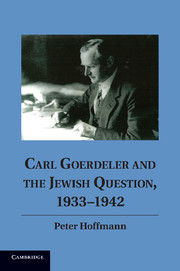2 - Carl Goerdeler
Published online by Cambridge University Press: 01 June 2011
Summary
Carl Friedrich Goerdeler was born in Schneidemühl in Posen on 31 July 1884 as the son of a circuit judge. He grew up in Schneidemühl (now Piła in Poland), and from the age of six in Marienwerder, an administrative town in the province of West Prussia, now Kwidzyn in northern Poland, where his father was transferred. His father also represented the district in the Prussian Legislative Assembly (Landtag) for the Free Conservative Party (Freikonservative Partei), a party of the elite that generally supported the government; after the First World War, its members and supporters tended to find themselves in the German National People's Party (Deutschnationale Volkspartei, DNVP). There prevailed in the Goerdeler home an atmosphere of the old-Prussian conservative civil-service value system of duty, frugality, integrity, and confidence in the consolidated power of the Prussian monarchy. History and politics held centre stage in day-to-day family discourse, but literary and other cultural interests were not neglected. From 1902 Goerdeler studied law in Tübingen for three semesters, then moved to the University of Königsberg, where he completed his studies in 1905. He then served in Königsberg's No. 16 Field Artillery Regiment. When he had passed his law examinations and by 1911 completed a dissertation on the concept of legal responsibility, he volunteered in a bank formerly named Preussische Seehandlung, from 1904 Königliche Seehandlung (after 1918 Preussische Staatsbank).
He decided against a career as a judge and chose municipal administration instead.
- Type
- Chapter
- Information
- Carl Goerdeler and the Jewish Question, 1933–1942 , pp. 23 - 33Publisher: Cambridge University PressPrint publication year: 2011

